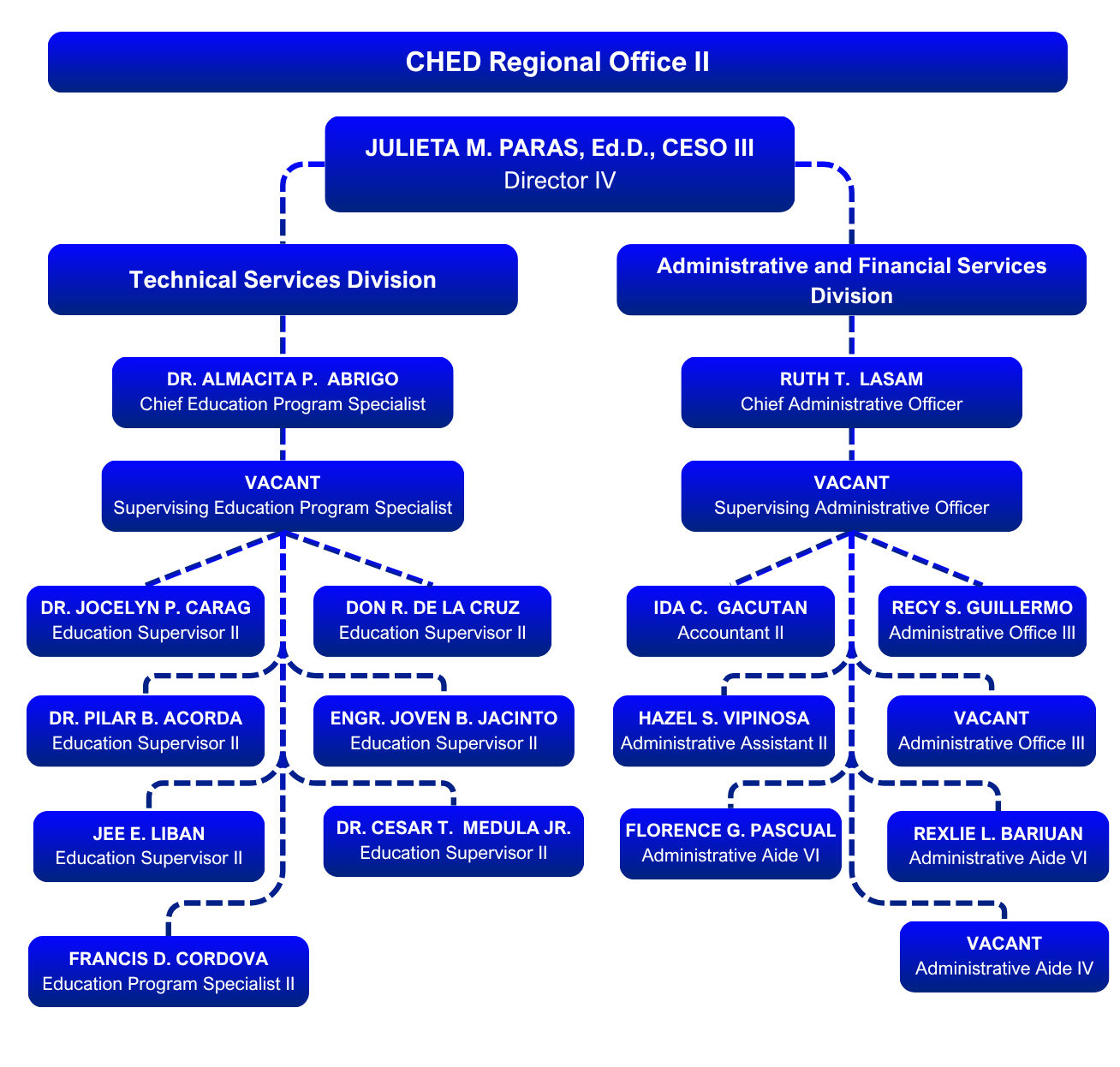The Commission on Higher Education (CHED) was created on May 18, 1994 through the passage of Republic Act No. 7722, or the Higher Education Act of 1994. CHED, an attached agency to the Office of the President for administrative purposes, is headed by a chairperson and four commissioners, each having a term of office of four years. The Commission En Banc acts as a collegial body in formulating plans, policies and strategies relating to higher education and the operation of CHED.
The creation of CHED was part of a broad agenda of reforms on the country’s education system outlined by the Congressional Commission on Education (EDCOM) in 1992. Part of the reforms was the trifocalization of the education sector into three governing bodies: the CHED for tertiary and graduate education, the Department of Education (DepEd) for basic education and the Technical Education and Skills Development Authority (TESDA) for technical-vocational and middle-level education.
In 1997, Republic Act (RA) No. 8292, otherwise known as the “Higher Education Modernization Act of 1997” was passed to establish a complete, adequate and integrated system of higher education. The said law also modified and made uniform the composition of the Governing Boards of chartered state universities and colleges (SUCs) nationwide in order to:(a) achieve a more coordinated and integrated system of higher education;(b) render them more effective in the formulation and implementation of policies on higher education;(c) provide for more relevant direction in their governance; and (d) ensure the enjoyment of academic freedom as guaranteed by the Constitution.
Philippine higher education system that is equitable and producing locally responsive, innovative, and globally competitive graduates and lifelong learners.
To promote equitable access and ensure quality and relevance of higher education institutions and their programs.
| A. Promote relevant and quality higher education (i.e. higher education institutions and programs are at par with international standards and graduates and professionals are highly competent and recognized in the international arena); |
| B. Ensure that quality higher education is accessible to all who seek it particularly those who may not be able to afford it; |
| C. Guarantee and protect academic freedom for continuing intellectual growth, advancement of learning and research, development of responsible and effective leadership, education of high level professionals, and enrichment of historical and cultural heritages; and |
| D. Commit to moral ascendancy that eradicates corrupt practices, institutionalizes transparency and accountability and encourages participatory governance in the Commission and the sub-sector. |
QUALITY POLICY STATEMENT
We, at the Commission on Higher Education (CHED), shall lead the Philippine higher education sector to:
Cultivate an equitable and sustainable higher education landscape that produces locally responsive, innovative, globally competitive graduates, and lifelong learners;
Harmonize mandates to promote inclusive access to higher education, ensure sustainable quality assurance of programs, and assert relevance of institutions;
Exemplify resilience and humility in service, integrity, excellence, and development-driven mindset; and,
Demonstrate continuous improvement in our Quality Management System to achieve our vision.
As provided for under Section 8 of Republic Act (R.A.) No. 7722, the Commission on Higher Education shall have the following powers and functions:
| ● | Formulate and recommend development plans, policies, priorities, and programs on higher education; |
| ● | Formulate and recommend development plans, policies, priorities, and programs on research; |
| ● | Recommend to the executive and legislative branches priorities and grants on higher education and research; |
| ● | Set minimum standards for programs and institutions of higher learning recommended by panels of experts in the field and subject to public hearing, and enforced the same; |
| ● | Monitor and evaluate the performance of programs and institutions of higher learning for appropriate incentives as well as the imposition of sanctions such as, but not limited to, diminution or withdrawal of subsidy, recommendation on the downgrading or withdrawal of accreditation, program termination or school course; |
| ● | Identify, support and develop potential centers of excellence in program areas needed for the development of world-class scholarship, nation building and national development; |
| ● | Recommend to the Department of Budget and Management (DBM) the budgets of public institutions of higher learning as well as general guidelines for the use of their income; |
| ● | Rationalize programs and institutions of higher learning and set standards, policies and guidelines for the creation of new ones as well as the conversion or elevation of schools to institutions of higher learning, subject to budgetary limitations and the number of institutions of higher learning in the province or region where creation, conversion or elevation is sought to be made; |
| ● | Develop criteria for allocating additional resources such as research and program development grants, scholarships, and the other similar programs: Provided, that these shall not detract from the fiscal autonomy already enjoyed by colleges and universities; |
| ● | Direct or redirect purposive research by institutions of higher learning to meet the needs of agro-industrialization and development; |
| ● | Devise and implement resource development schemes; |
| ● | Administer the Higher Education Development Fund, as described in Section 10 of R.A. 7722, which will promote the purposes of higher education; |
| ● | Review the charters of institutions of higher learning and state universities and colleges including the chairmanship and membership of their governing bodies and recommend appropriate measures as basis for necessary action; |
| ● | Promulgate such rules and regulations and exercise such other powers and functions as may be necessary to carry out effectively the purpose and objectives of R.A. 7722; and |
| ● | Perform such other functions as may be necessary for its effective operations and for the continued enhancement, growth and development of higher education. |
CHED Regional Offices
The Regional Offices are the dynamic and empowered frontline organic units of CHED that adhere to the highest principles of good governance, accountability, transparency and efficient service to the stakeholders of higher education. With the most crucial role the CHEDRO’s play in the implementation of the policies and programs of the Commission and in higher education reform, they have the following general terms of reference :
- Monitors the implementation of national policies and programs and enforcement of academic standards at the regional level;
- Coordinates the formulation of higher education plans and programs that are responsive to the needs and potentials of the region in consultation with other regional offices;
- Provides assistance to the CHED Central Office in the allocation of resources and preparation of the composite higher education budget for the region;
- Undertakes research; conducts/outsources studies applicable to the region and disseminates information to all institutions and agencies;
- Provides technical assistance and develops relevant training program to higher education institutions; and
- Collects and analyzes higher education information relative to the region and maintains an adequate management information system.
Specifically, the CHEDROs also :
- Implements the plans, policies, standards, guidelines, rules and regulations promulgated by the Commission concerning the operation of Higher Education Institutions in the different regions;
- Monitors and evaluates the performance of Higher Education Institutions in the region in terms of compliance to minimum standards for the various higher education programs;
- Issues permits and recognition for the various program offerings of private higher education institutions;
- Coordinates the implementation of projects and programs of the Commission in the region for the development and improvement of the higher education system;
- Formulates and updates regional higher education development plans;
- Implements scholarship, study grants and student financial assistance programs as well as other relevant student auxiliary services
- Gathers and consolidates basic higher education data/statistics for the region;
- Disseminates PSGs, higher education data and other relevant information for guidance of stakeholders;
- Coordinates the provision of efficient and effective student services (e.g., issuance of Special Orders; certification, authentication and verification of academic records, etc.);
- Represents the Commission and participates in the affairs of the Regional Development Council; and
- Establishes networks/linkages with and participates in the activities of other government and non-government agencies, organizations or institutions.


The CHED LOGO is a representation of how Philippine Higher Education evolved.
The pyramid represents the ideal three-level, manpower structure of the country, comprising of basic level skills, middle or semi-skilled workers, and high or professional levels of human resource located at the apex of the pyramid and the primary concern of higher education.
The human silhouette inside the pyramid represents human resources development of every Filipino to become productive citizens of the country.
The rising sun symbolizes the dawning of a new era in higher education with the creation of CHED. With the emergence of CHED, higher education was given the much needed attention and appropriate reforms implemented which jump started the development of higher education as the prime mover in nation-building.
The color triad: red , yellow and blue correspond to the colors of the Philippine flags as CHED was created to be the main advocate and pillar of nation building.
The year 1994 indicates the year when CHED was created by law. On May 18, 1994, CHED was established through Republic Act No. 7722, otherwise known as the “Higher Education Act 1994” The CHED is an Attached.


